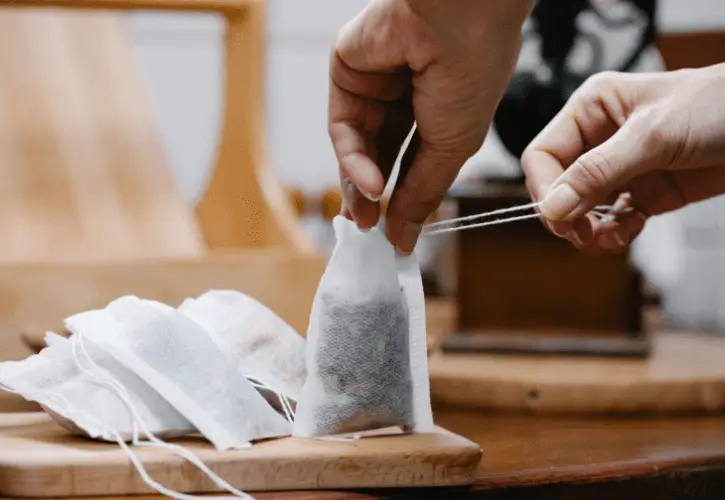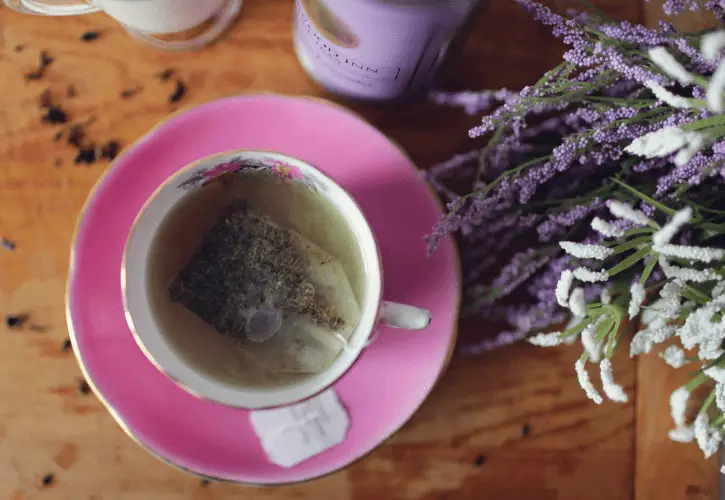So, are tea bags compostable?
When you think about composting something, the first thing you should ask yourself is whether the object you’re about to put into the heap is organic matter or not. Many people may look at a tea bag and think “Tea leaves are definitely organic matter,” and toss it right into the pile.
Yes, you can add tea leaves to your compost bin. But, did you know that many tea bags contain plastic in the bagging material? About 30% of tea bags on the market today are composed of polypropylene, a rigid, crystalline thermoplastic that is not compostable.
Sadly, the plastic doesn’t stop there; even the string may contain this thermoplastic. And do not forget about the metal staple that is attached to the other end of the tea bag string. Because of these non-biodegradable components, they will not be broken down and could actually damage the environment if you place your composted soil back into the ground.
The Tea on: Are Tea Bags Compostable?
Before composting your tea bags, it is very important to ensure that they are made from 100% biodegradable materials. Thankfully, there are some tea bag brands that use plant-based or biodegradable fibers that will break down in the composting bin. These compostable tea bags are designed to be more environmentally friendly and reduce waste.
Some of our favorite biodegradable and compostable tea bags are these Eco-Fil Tea Filter Bags. They’re made of 100% wood pulp and are super eco-friendly!
To make sure your tea bags are compostable, check the packaging description. The compost certifications such as “ASTM D6400” for the United States or “EN 13432” for Europe both specify that the biodegradable/compostable products (like your tea bag) will completely decompose in a composting setting within a specific time frame.
This will ensure leaving no harmful residues behind. So, be on the lookout for those two certifications, or any descriptions on the tea bag box saying that it is 100% biodegradable/made with plant-based products.
When in doubt, gut the tea bag so that you can compost the tea leaves, but toss the tea bag, string, and staple into the rubbish. If you want to be extra cautious in reducing your footprint, you can always consider switching to loose-leaf tea.
When purchasing loose-leaf tea, you can reduce waste by reusing an old glass container to place your loose-leaf tea.

What Could Happen If I Compost Plastic Tea Bags
There are several reasons why composting partially non-biodegradable items like tea bags is dangerous. Most plastics are not biodegradable, meaning that they do not break down over time. Plastic sits in the environment for hundreds of years, contributing to the pollution problem in our waterways, oceans, lands, and air.
Plastics can contaminate the composting pile and interrupt the decomposing process. The scariest part about non-biodegradable plastics that are incorrectly tossed into the compost is that they do not break down. This can lead to the generation of microplastics!
Microplastics are an environmental concern because the plastic becomes super tiny particles that find their way into the soil, and water sources, and even travel in the air due to their small size.
Breathing deposits of microplastics into the lungs sounds terrifying and very unhealthy. Overall, the plastic remains in the compost, reducing compost quality and usefulness as a soil amendment, and can lead to microplastics being created.
These are some reasons why it is important to avoid adding plastics or any non-biodegradable materials (like staples) to the compost pile.
Are Tea Bags Compostable with Worms?
Wormies love compostable tea bags which contribute to producing nutrient-rich compost. Vermicompost bins, or worm bins, specifically use red worms to help break down organic materials. Remember to check that the tea bags are truly compostable or 100% biodegradable.
Check for certifications or labels indicating their compostability. Tear the tea bags into smaller pieces to speed up the composing process. This will allow the worms to eat the tea bags easier. Bury the tea bags to the middle of the heap to prevent pests and fruit flies (if you enjoy fruit teas). Lastly, don’t forget to remove any staples tea bags, if there are any.
If you’re interested in vermicomposting (worm composting), check out my article on Worm Composting: Everything You Need To Get Started.
